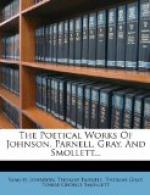In 1773 he fulfilled his long-cherished purpose of visiting Scotland and the Hebrides, the story of which trip he told afterwards in his usual rotund and massive style, and which was recounted with far more liveliness and verisimilitude by Boswell. In 1774 he lost Goldsmith, who had long been his friend, whom he had counselled, rebuked, assisted, loved, and laughed at, and at whose death he was deeply grieved. In 1775, the publication of his “Tour to the Hebrides” brought him in collision with the perfervidum ingenium Scotorum, and especially with James Macpherson, to whom Johnson sent a letter which crushed him like a catapult. Macpherson, as well as Rob Roy, was only strong on his native heath, and off it was no match for old Sam, whose prejudices, passions, and gigantic powers, combined to make him altogether irresistible in a literary duel. The same year, the University of Oxford conferred on him the degree of Doctor of Laws; and in the close of it, he paid a visit, along with the Thrales, to Paris.
In 1776 nothing remarkable occurred in his history, unless it were the interview which Boswell so admirably manoeuvred to bring about between him and Jack Wilkes. Everybody remembers how well the bear and the monkey for the time agreed, and how both turned round to snub the spaniel, who had been the medium of their introduction to each other.
In 1777 he was requested by the London booksellers to prefix prefaces to the “English Poets,” part of which was issued the next year, and the rest in 1780 and 1781, as the “Lives of English Poets.” This work has generally been regarded as Johnson’s masterpiece. It nowhere, indeed, displays so much of the creative, the inventive, the poetical, as his “Rasselas,” and many of his smaller tales and fictions. Its judgments, too, have been often and justly controverted. The book is, undoubtedly, a storehouse of his prejudices, as well as of his wisdom. Its treatment of Milton, the man, for instance, is insufferably insolent, although ample justice is done to Milton, the poet of the “Paradise Lost.” Some poetasters he has overpraised, and some true but minor poets he has thrust down too far in the scale. But the work, as a whole, is full of inextinguishable life, and has passages verging on the eloquence and power of genius. A piece of stern, sober, yet broad and animated composition, rather careless in dates, and rather cursory in many of its criticisms, it displays unequalled force of thought, and pointed vigour of style, and when taken in connexion with the age of the author (seventy), is altogether marvellous. Truly there were “giants in those days,” and this was a Briareus.




